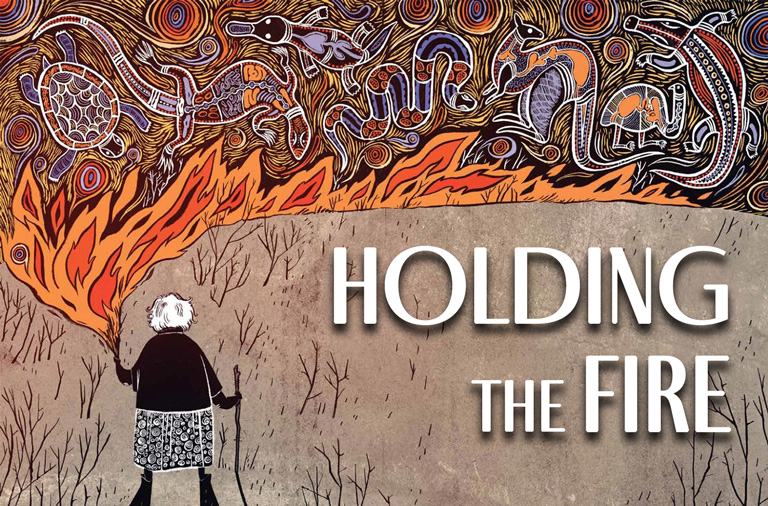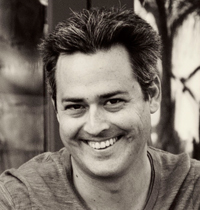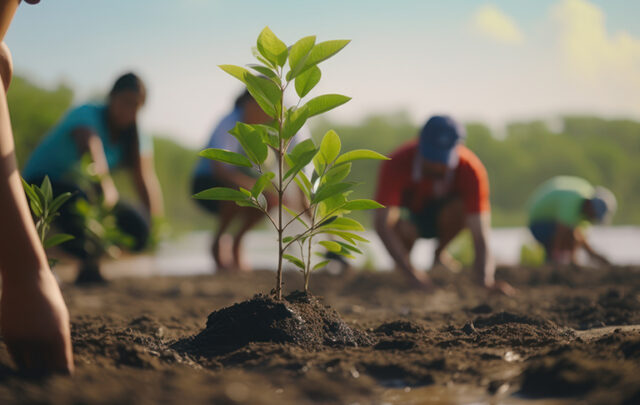As Post Carbon Institute and Resilience.org celebrate Indigenous Peoples’ Day, we’re excited to launch a new podcast series – Holding the Fire: Indigenous Voices on the Great Unraveling.
Sometimes it takes a little bit of hindsight or a shift in understanding to realize just how bizarre or insensitive certain cultural norms can be. Take, for example, Columbus Day, which has become increasingly questioned or rejected across the United States. Though that holiday, first adopted nationally in 1931, was largely motivated by an effort to counter bigotry against Italian-Americans, at best it tried to celebrate one group of people while inflicting pain on another.
It’s hard for me to imagine how Columbus Day must feel to Native American and Indigenous persons everywhere. As an American Jew, the closest I can come up with is if the U.S. celebrated Father Charles Conklin Day, whose weekly antisemitic rants in the 1930s reached tens of millions of radio listeners. But that’s not even close.
While Columbus Day remains a federal holiday in the United States, the tide has been turning. For the first time in 2021 – thanks in no small part to the advocacy of a teenaged member of the White Mountain Apache Tribe – a U.S. President issued a proclamation recognizing Indigenous Peoples’ Day. It only took a couple of centuries. The fact that Christopher Columbus is still officially celebrated by local, state, and federal governments at all, however, remains bizarre and unconscionable.
I’ll be honest, I’m not much for national holidays or birthdays for that matter. Maybe I’m just a curmudgeon (cue vigorous head nodding from my family, friends, and colleagues). But today matters to me, and it’s not because Indigenous Peoples’ Day also happens to fall on my birthday this year.
As I personally, and Post Carbon Institute organizationally, grapple with the simultaneous unraveling of so many environmental and social systems, we’ve increasingly turned towards Indigenous communities. The wellbeing of Indigenous peoples around the world should be valued and supported in its own right but there are many compelling reasons why you and I might want to listen to, learn from, and support Indigenous members of our human family. These are fellow beings, after all, who have experienced the most profound collapse of their communities and displayed remarkable resilience; learned over many millennia how to live with greater balance, sustainability, and mutualism with the more-than-human world; and continue to protect nearly 80% of the remaining, precious biodiversity on the planet.
Over the last ten months, I’ve been honored to work with journalist and author Dahr Jamail, Post Carbon podcast producer extraordinaire Melody Travers Allison, my colleague Rob Dietz, and a wonderful community of advisors to produce Holding the Fire – a podcast featuring conversations with eleven Indigenous thought leaders from across the globe who offer their unique perspectives, gained from lived experience and cultural memory, on this moment of shared crises.
The podcast is meant for anyone concerned about climate change, species extinctions, loss of social cohesion, the specter of collapse, and other aspects of the Great Unraveling. If you’re reading this, my guess is that you’re part of that growing club.
On this day in particular, I encourage you to take a break from your regular programming (doom-scrolling?) and give the first episode (in which Dahr shares his own story and motivations for working on this project, along with a flavor of what our guests over the course of the podcast have to share) or jump straight into the conversation with the incredible Dr. Anne Poelina.
If you value what you hear, please consider subscribing at your podcast app of choice to get future episodes as they come out, and spread the word by writing a review or sharing the podcast with anyone you think might also benefit.






